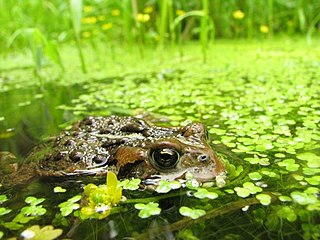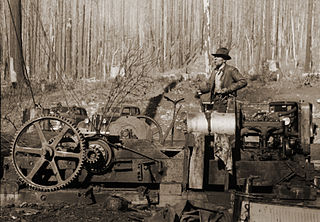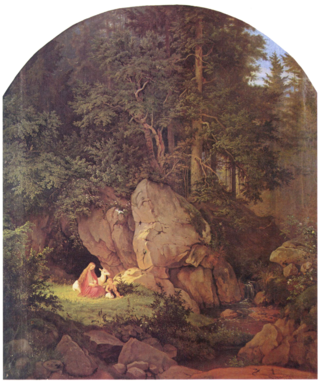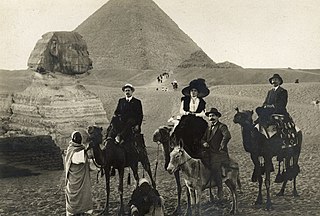
Ecology is the study of the relationships among living organisms, including humans, and their physical environment. Ecology considers organisms at the individual, population, community, ecosystem, and biosphere level. Ecology overlaps with the closely related sciences of biogeography, evolutionary biology, genetics, ethology, and natural history.
The conservation movement, also known as nature conservation, is a political, environmental, and social movement that seeks to manage and protect natural resources, including animal, fungus, and plant species as well as their habitat for the future. Conservationists are concerned with leaving the environment in a better state than the condition they found it in. Evidence-based conservation seeks to use high quality scientific evidence to make conservation efforts more effective.

Human ecology is an interdisciplinary and transdisciplinary study of the relationship between humans and their natural, social, and built environments. The philosophy and study of human ecology has a diffuse history with advancements in ecology, geography, sociology, psychology, anthropology, zoology, epidemiology, public health, and home economics, among others.
Jeffry D. Wert is an American historian and author specializing in the American Civil War. He has written several books on the subject, which have been published in multiple languages and countries.

William Least Heat-Moon is an American travel writer and historian of English, Irish, and alleged Osage ancestry. He is the author of several books which chronicle unusual journeys through the United States, including cross-country trips by boat and, in his best known work, about his journey in a 1975 Ford Econoline van.

Environmental resource management is the management of the interaction and impact of human societies on the environment. It is not, as the phrase might suggest, the management of the environment itself. Environmental resources management aims to ensure that ecosystem services are protected and maintained for future human generations, and also maintain ecosystem integrity through considering ethical, economic, and scientific (ecological) variables. Environmental resource management tries to identify factors affected by conflicts that rise between meeting needs and protecting resources. It is thus linked to environmental protection, sustainability, integrated landscape management, natural resource management, fisheries management, forest management, and wildlife management, and others.
Ecology is a new science and considered as an important branch of biological science, having only become prominent during the second half of the 20th century. Ecological thought is derivative of established currents in philosophy, particularly from ethics and politics.
Jay Wright is a poet, playwright, and essayist. Born in Albuquerque, New Mexico, he lives in Bradford, Vermont. Although his work is not as widely known as other American poets of his generation, it has received considerable critical acclaim, with some comparing Wright's poetry to the work of Walt Whitman, T. S. Eliot and Hart Crane. Others associate Wright with the African-American poets Robert Hayden and Melvin B. Tolson, due to his complexity of theme and language, as well as his work's utilization and transformation of the Western literary heritage. Wright's work is representative of what the Guyanese-British writer Wilson Harris has termed the "cross-cultural imagination", inasmuch as it incorporates elements of African, European, Native American and Latin American cultures. Following his receiving the Bollingen Prize in Poetry in 2005, Wright is recognized as one of the principal contributors to poetry in the early 21st century. Dante Micheaux has called Wright "unequivocally, the greatest living American poet"."

Environmental history is the study of human interaction with the natural world over time, emphasising the active role nature plays in influencing human affairs and vice versa.

The Knickerbocker, or New-York Monthly Magazine, was a literary magazine of New York City, founded by Charles Fenno Hoffman in 1833, and published until 1865. Its long-term editor and publisher was Lewis Gaylord Clark, whose "Editor's Table" column was a staple of the magazine.

Environmental art is a range of artistic practices encompassing both historical approaches to nature in art and more recent ecological and politically motivated types of works. Environmental art has evolved away from formal concerns, for example monumental earthworks using earth as a sculptural material, towards a deeper relationship to systems, processes and phenomena in relationship to social concerns. Integrated social and ecological approaches developed as an ethical, restorative stance emerged in the 1990s. Over the past ten years environmental art has become a focal point of exhibitions around the world as the social and cultural aspects of climate change come to the forefront.
John Robert McNeill is an American environmental historian, author, and professor at Georgetown University. He is best known for "pioneering the study of environmental history". In 2000 he published Something New Under the Sun: An Environmental History of the Twentieth-Century World, which argues that human activity during the 20th century led to environmental changes on an unprecedented scale, primarily due to the energy system built around fossil fuels.
Ecological art is an art genre and artistic practice that seeks to preserve, remediate and/or vitalize the life forms, resources and ecology of Earth. Ecological art practitioners do this by applying the principles of ecosystems to living species and their habitats throughout the lithosphere, atmosphere, biosphere, and hydrosphere, including wilderness, rural, suburban and urban locations. Ecological art is a distinct genre from Environmental art in that it involves functional ecological systems-restoration, as well as socially engaged, activist, community-based interventions. Ecological art also addresses politics, culture, economics, ethics and aesthetics as they impact the conditions of ecosystems. Ecological art practitioners include artists, scientists, philosophers and activists who often collaborate on restoration, remediation and public awareness projects.

The Rocky Mountains, Lander's Peak is an 1863 landscape oil painting by the German-American painter Albert Bierstadt. It is based on sketches made during Bierstadt's travels with Frederick W. Lander's Honey Road Survey Party in 1859. The painting shows Lander's Peak in the Wyoming Range of the Rocky Mountains, with an encampment of Native Americans in the foreground. It has been compared to, and exhibited with, The Heart of the Andes by Frederic Edwin Church. Lander's Peak immediately became a critical and popular success and sold in 1865 for $25,000.

A gyppo or gypo logger is a logger who runs or works for a small-scale logging operation that is independent from an established sawmill or lumber company. The gyppo system is one of two main patterns of historical organization of logging labor in the Pacific Northwest United States, the other being the "company logger".

David S. Painter is an associate professor of international history at Georgetown University. He is a leading scholar of the Cold War and United States foreign policy during the 20th century, with particular emphasis on their relation to oil.

The German Forest was a phrase used both as a metaphor as well as to describe in exaggerated terms an idyllic landscape in German poems, fairy tales and legends of the early 19th-century Romantic period. Historical and cultural discourses declared it as the symbol of Germanic-German art and culture, or as in the case of Heinrich Heine or Madame de Staël, as a counter-image of French urbanity. It was also used with reference to historical or legendary events in German forests, such as Tacitus' description of the Battle of the Teutoburg Forest or even the nature mysticism of the stylized Germanic national myth, the Nibelungenlied as the history of its multi-faceted reception shows.
Organizational adaptation is a concept in organization theory and strategic management that is used to describe the relationship between an organization and its environment. The conceptual roots of organizational adaptation borrows ideas from organizational ecology, evolutionary economics, industrial and organizational psychology, and sociology. A systematic review of 50 years worth of literature defined organizational adaptation as "intentional decision-making undertaken by organizational members, leading to observable actions that aim to reduce the distance between an organization and its economic and institutional environments".

The International Drillers is the name given to the more than 500 drillers from Lambton County who worked in oil fields across the world between December 1873 to the mid-1940s. Many of the International Drillers grew up learning the oil business in Enniskillen County and provided the skilled labour, expertise and technology necessary for the development of the global petroleum industry.
Brian Morey Boom is an American botanist who specializes in the flora of the Guianas and the Caribbean, the family Rubiaceae, ethnobotany, and economic botany.











